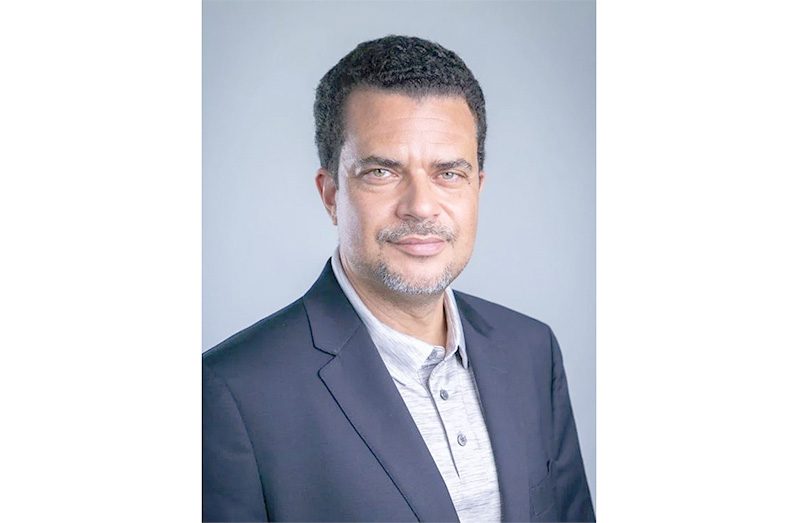–Senior Counsel Jonas on institutions’ recent actions to close accounts of those associated with US-sanctioned Mohamed
ATTORNEY-AT-LAW and former founding member of A New and United Guyana (ANUG), Timothy Jonas, S.C., has said that local banks must decide whether to sever all ties with anyone that is affiliated with US-sanctioned Azruddin Mohamed or risk financial collapse.
During an online discussion, he highlighted the dangers of maintaining business relationships with individuals sanctioned by the U.S. Department of the Treasury’s Office of Foreign Assets Control (OFAC) or those affiliated with them.
In June, Jonas and Ralph Ramkarran, S.C., announced their resignations from ANUG after it was absorbed by Mohamed’s party, We Invest in Nationhood (WIN).
Jonas said that local banks rely on honest relationships with correspondent financial institutions in the US.
“You got a credit card. Everybody on this forum got a credit card. Look at it. It says Visa. It says American Express. Look at your debit card, it says Visa,” he said, explaining: “When your family abroad sending money to you, they send money through the correspondent bank; and when you send money [abroad] or you want to go and shop on Amazon or you want to go online and buy something using credit card or your debit card, your bank has to make that request to that correspondent bank in the States.”
Jonas warned that those relationships would be jeopardised if local banks are found serving sanctioned individuals or affiliates of those sanctioned.
He said: “The day- Republic Bank, GBTI, Demerara Bank, Citizens- any of the local banks is punished because it has a customer and has not let go of that customer, you can’t go on Amazon and shop anymore. You can’t use your Visa Card anymore. You can’t use your American Express card anymore. And the next day that bank collapses financially.”
Several local banks have started severing ties with candidates of the US-sanctioned Mohamed’s WIN, affirming that this action is aligned with their usual risk assessment procedures.
Despite the known and reported repercussions, however, Mohamed has launched an attack on those institutions, calling for persons to boycott them.
In a June 2024 statement, the OFAC stated, “Azruddin and Mohamed’s Enterprise evaded Guyana’s tax on gold exports, and defrauded the Guyanese government of tax revenues by under-declaring their gold exports to Guyanese authorities. Between 2019 and 2023, Mohamed’s Enterprise omitted more than 10 thousand kilogrammes of gold from import-and-export declarations and avoided paying more than US$50 million in duty taxes to the Government of Guyana.”
Recently, US Ambassador to Guyana Nicole Theriot said that the US Government, particularly the OFAC, views any elevation of Mohamed, the leader of the We Invest in Nationhood (WIN) party, as “problematic”.
Speaking candidly with reporters recently, Ambassador Theriot shared the views of the US Government, particularly the OFAC, concerning Mohamed.
“Yes, we are concerned anytime an OFAC-sanctioned individual has the potential to become a member of government, it’s problematic in multiple ways… We have to be very careful if that person is involved. Let’s say we were on a certain committee; we would have to be very careful in working with that committee. We have to make sure that we didn’t work with him specifically,” Theriot stated.
The Ambassador elaborated that US law strictly limits engagement with individuals under OFAC sanctions, making Mohamed’s potential entry into Parliament, whether in government or opposition, an issue of regulatory and reputational risk for both diplomatic missions and private sector interests.
“He would still be a member of government, so that would be a concern for us,” Theriot said when asked whether Mohamed’s presence in the opposition would still raise alarm.
But the Ambassador did not stop at government engagement. She raised a more urgent concern, such as the ripple effects on US investment and business confidence in Guyana.
“When you see an OFAC-sanctioned individual become a part of an official within a government, it sends concern through the private sector of the United States. So, you see, US companies are often rethinking their relationships in the country.
“We’ve seen it in Afghanistan and other countries’ companies … they look to de-risk or even cut ties. And we’re in such a beautiful position right now. All these US companies want to come to Guyana. I don’t want that to change,” Theriot explained.
Local banks must cut ties or risk financial collapse
SHARE THIS ARTICLE :
Facebook
Twitter
WhatsApp



.jpg)









